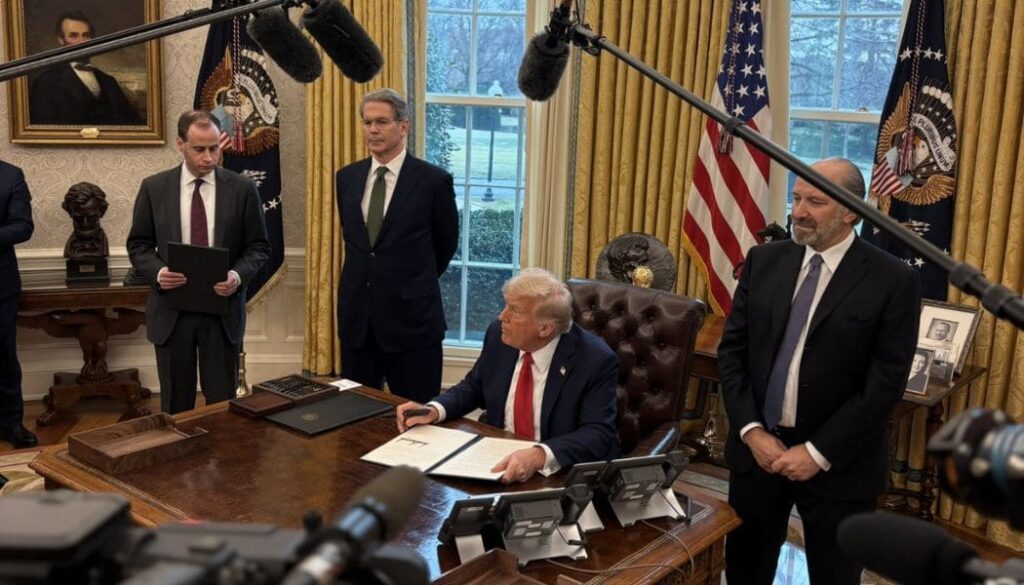In a surprising move, former President Donald Trump signed an Executive Order on Monday (3rd), establishing the creation of a Sovereign Wealth Fund in the United States. While the order does not explicitly mention Bitcoin, industry experts suggest that this financial framework could be a significant step toward incorporating digital assets into the nation’s financial reserves.
Could the U.S. Be Preparing for a Bitcoin Reserve?
The announcement sparked speculation, especially among cryptocurrency enthusiasts, as key figures from the crypto industry were present during the signing. Many analysts believe that this initiative could open the door for the United States to consider Bitcoin as part of its national reserves.
Michael van de Poppe, a well-known crypto analyst, pointed out that the order was signed just one day before a scheduled press conference on digital assets. He speculated that the recent market downturn might have been orchestrated by major players to accumulate assets before a policy shift.
“Major players have triggered a capitulation across the entire market to fill their own pockets. Today has been a crazy day, with the market experiencing one of the heaviest daily sell-offs in altcoins. Shortly after that, Trump signs the Sovereign Wealth Fund – possibly with Bitcoin included. Tomorrow, there is a press conference on digital assets. Nothing happens by accident,” Van de Poppe stated.
What is a Sovereign Wealth Fund?
A Sovereign Wealth Fund (SWF) is essentially a government-owned investment pool, typically used to manage national wealth derived from budget surpluses, natural resources, or foreign currency reserves. In countries like Norway and the United Arab Emirates, these funds serve as financial cushions, investing in stocks, bonds, and other assets to secure long-term economic stability.
However, the concept of a Sovereign Wealth Fund in the U.S. has puzzled many analysts. Unlike nations that operate with fiscal surpluses, the United States has run a budget deficit for decades. This raises questions about how the fund will be financed and what assets it will hold.
Although Trump provided no detailed explanation, he did mention that the Sovereign Wealth Fund might be used in potential acquisitions, including the purchase of the social media platform TikTok.
“We’ll do something, maybe with TikTok, maybe not,” Trump stated. “If we make the right deal, we will do it. If not, we won’t… we can put that into the Sovereign Wealth Fund.”

Cryptocurrency Advocates Were Present at the Signing
One of the most compelling signs that Bitcoin could be linked to this initiative was the presence of two key pro-crypto figures at the signing ceremony:
- Scott Bessent, Treasury Secretary and supporter of the idea of a Strategic Reserve.
- Howard Lutnick, Commerce Secretary and a well-known Bitcoin and Tether advocate. Lutnick has been tasked with developing the Sovereign Wealth Fund over the next 12 months.
Additionally, Senator Cynthia Lummis, a vocal proponent of Bitcoin adoption in the U.S., shared the White House’s announcement on social media, appearing enthusiastic about the initiative. Lummis has previously argued that the U.S. should move away from gold reserves and adopt Bitcoin as a national asset. She was recently appointed to a new legislative subcommittee focused on cryptocurrency regulations.
Could This Be the First Step Toward a U.S. Bitcoin Reserve?
The possibility of integrating Bitcoin into the Sovereign Wealth Fund aligns with Trump’s evolving stance on cryptocurrency. Initially skeptical, Trump has recently expressed a more favorable outlook, especially as digital assets gain mainstream acceptance. Some experts believe that a U.S. Bitcoin reserve would help counterbalance economic uncertainties and strengthen the dollar’s position in global markets.
With institutional adoption of Bitcoin accelerating, central banks worldwide are exploring ways to incorporate digital assets into their financial strategies. Countries like El Salvador have already taken steps to use Bitcoin as legal tender and integrate it into government reserves. Could the U.S. be next?
The Strategic Implications of a Sovereign Wealth Fund
A Sovereign Wealth Fund would provide the U.S. government with a flexible financial tool to stabilize the economy and make strategic investments. If structured correctly, it could serve as a hedge against inflation and market volatility. Some key areas where the fund could be utilized include:
- Infrastructure Investments: Allocating capital for national projects, reducing dependency on foreign investors.
- Technology and Innovation: Funding research and development in AI, quantum computing, and biotechnology.
- Energy Sector: Supporting clean energy initiatives and securing U.S. energy independence.
- Cryptocurrency and Digital Assets: Establishing Bitcoin as a strategic reserve asset.
The inclusion of Bitcoin in the Sovereign Wealth Fund would signal a major shift in U.S. monetary policy. It could also place the U.S. at the forefront of digital asset adoption, competing with nations that are actively exploring central bank digital currencies (CBDCs).
Challenges and Skepticism
Despite the excitement, some analysts remain skeptical about the feasibility of a U.S. Bitcoin reserve. The primary concerns include:
- Regulatory Uncertainty: The U.S. government has historically taken a cautious approach toward cryptocurrencies, with agencies like the SEC and the Federal Reserve expressing concerns over volatility and security risks.
- Deficit Spending: Given the country’s ongoing budget deficits, funding a Sovereign Wealth Fund would require alternative revenue sources, which remain unclear.
- Market Manipulation Fears: Some experts worry that major financial players could use government involvement in Bitcoin to manipulate prices and create unfair market advantages.
The Global Perspective on Sovereign Wealth Funds
Globally, Sovereign Wealth Funds have been used successfully to manage economic stability and long-term growth. For example:
- Norway’s Government Pension Fund Global is one of the largest Sovereign Wealth Funds in the world, managing over $1.4 trillion.
- China Investment Corporation (CIC) strategically invests in global markets to expand China’s financial influence.
- Saudi Arabia’s Public Investment Fund (PIF) has been used to finance Vision 2030, a major economic diversification initiative.
If the U.S. successfully integrates Bitcoin into its Sovereign Wealth Fund, it could set a precedent for other countries to follow, accelerating global adoption of digital assets.
Conclusion: A Pivotal Moment for U.S. Crypto Policy
While details remain scarce, Trump’s Executive Order marks a potentially historic moment for Bitcoin and digital assets in the United States. If the Sovereign Wealth Fund incorporates Bitcoin, it could signal a major shift in U.S. monetary policy, potentially paving the way for broader institutional and governmental adoption.
As the world waits for further announcements, the crypto industry is watching closely. Will the U.S. embrace Bitcoin as a strategic asset? Or is this simply another speculative move in the ever-evolving financial landscape? Only time will tell, but one thing is certain – the conversation around Bitcoin’s role in the U.S. economy is far from over.
With this development, the Sovereign Wealth Fund could become one of the most powerful economic tools in U.S. history, potentially reshaping global financial markets. As cryptocurrency continues to disrupt traditional finance, the role of Bitcoin in national reserves could mark a significant evolution in economic strategy.




One thought on “Donald Trump Signs Executive Order Creating Sovereign Wealth Fund: Could Bitcoin Be Involved?”